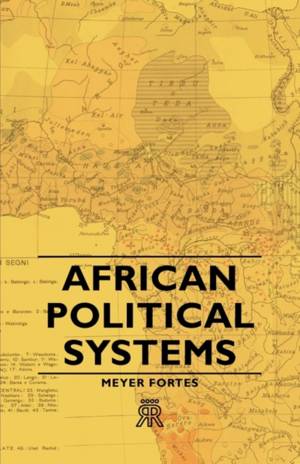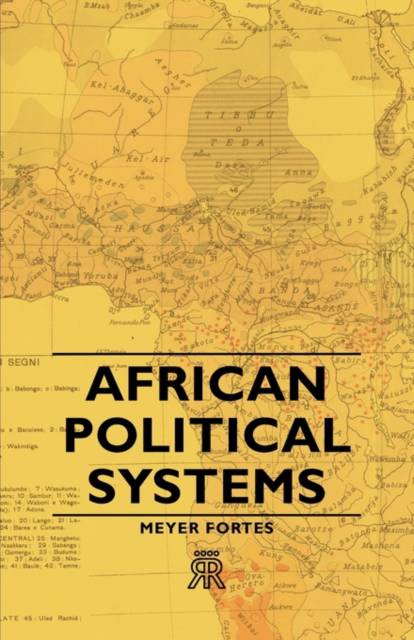
- Retrait gratuit dans votre magasin Club
- 7.000.000 titres dans notre catalogue
- Payer en toute sécurité
- Toujours un magasin près de chez vous
- Retrait gratuit dans votre magasin Club
- 7.000.000 titres dans notre catalogue
- Payer en toute sécurité
- Toujours un magasin près de chez vous
Description
One object we had in initiating this study was to provide a convenient reference book for anthropologists. We also hope that it will be a contribution to the discipline of comparative politics. We feel sure that the first object has been attained, for the societies described are representative of common types of African political systems and, taken together, they enable a student to appreciate the great variety of such types. As the sketch-map on p. 2 shows, the eight systems described are widely distributed in the continent. Most of the forms described are variants of a pattern of political organization found among contiguous or neighbouring societies, so that this book covers, by implication, a very large part of Africa. We are aware that not every type of political system found in Africa is represented, but we believe that all the major principles of African political organization are brought out in these essays. Several contributors have described the changes in the political systems they investigated which have taken place as a result of European conquest and rule. If we do not emphasize this side of the subject it is because all contributors are more interested in anthropological than in administrative problems. We do not wish to imply, however, that anthropology is indifferent to practical affairs. The policy of Indirect Rule is now generally accepted in British Africa. We would suggest that it can only prove advantageous in the long run if the principles of African political systems, such as this book deals with, are understood. Each essay is a condensation of a detailed study of the political system of a single people undertaken in recent years by the most advanced methods of field-work by students trained in anthropological theory. A degree of brevity that hardly does justice to some important topics has been necessary for reasons of space. Each essay furnishes, nevertheless, a useful standard by which the political systems of other peoples in the same area may be classified. No such classification is attempted in this book, but we recognize that a satisfactory comparative study of African political institutions can only be undertaken after a classification of the kind has been made. It would then be possible to study a whole range of adjacent societies in the light of the Ngwato system, the Tale system, the Ankole system, the Bemba system, and so on, and, by analysis, to state the chief characters of series of political systems found in large areas. An analysis of the results obtained by these comparative studies in fields where a whole range of societies display many similar characteristics in their political systems would be more likely to lead to valid scientific generalizations than comparison between particular societies belonging to different areas and political types.
Spécifications
Parties prenantes
- Auteur(s) :
- Editeur:
Contenu
- Nombre de pages :
- 328
- Langue:
- Anglais
Caractéristiques
- EAN:
- 9781406701258
- Date de parution :
- 17-11-06
- Format:
- Livre broché
- Format numérique:
- Trade paperback (VS)
- Dimensions :
- 140 mm x 216 mm
- Poids :
- 417 g







